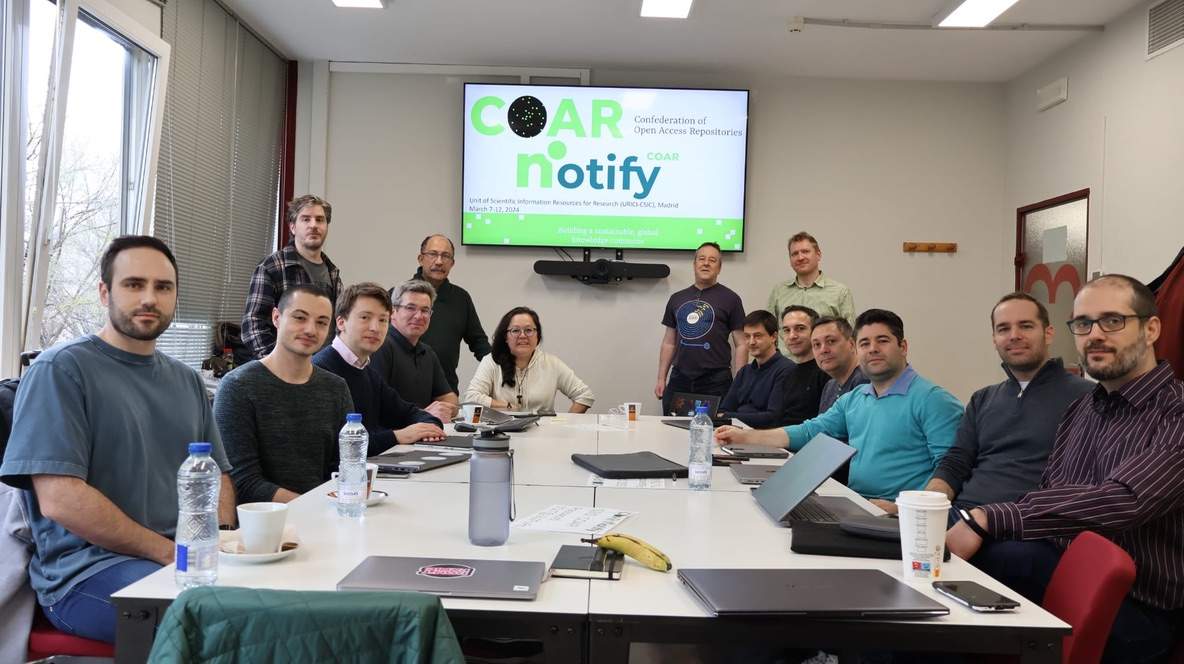
On the 7th and 8th March 2024 a core group of developers came together to compare their experiences with implementing COAR Notify in their systems. We were generously hosted by Isabel Bernal of CSIC in Madrid. In keeping with all COAR activities, a range of nationalities and domains was represented.
We discussed a range of technical issues, comparing notes on what had worked well, and what needed improvement or clarification. It was also a chance for begin to establish a community of COAR Notify developers. Judging by the level of engagement, and the conversations over dinner, I think we were successful in this!
I will write here in more detail in future posts about some of the deeper technical issues, but in the meantime here is a summary of some of the decisions and outcomes:
- Where COAR Notify implementation software is directly commissioned by the Notify project we will use the MIT license (a "permissive") license. However, we recognise that some platforms may require a different open-source license. We will not ordinarily work with software that is not open-source and licensed accordingly.
- We will make one immediate change to the protocol (documented in the change-log)
- After this immediate change to the protocol, we will use a more managed approach to versioning, deprecating etc. - however, we do not anticipate changing versions frequently.
- We will develop an interim catalogue (on this website) to include the following:
- Services implementing COAR Notify
- Specific workflows supported by each service
- Software platforms (e.g. repository platforms) which support each workflows
- Open-source code-bases involved in implementing or supporting COAR Notify
- Add more content to the Implementation Guide:
- Document options for limiting access from remote systems, with some examples and the scenarios they address.
- Extend the architecture section to include more options, and to add more detail to the pros, cons, affordances and consequences of each option.
- Document the pros and cons of storing notifications versus not storing them
- Document the recommended process for handling metadata with signposting.org - an end-to-end process
- Increase communications support for the developer community:
- Investigate using GitHub Discussions for forum
- Create a mailing list to be used only for rare, important announcements (all the developers at the meeting agreed to be subscribed to this)
- Define a new pattern for indicating that an activity was "un-processable”
The interim catalogue is already available (very much a "work-in-progress").
It was an excellent meeting - a really good group of developers doing important work. The COAR Notify team gained some invaluable insights into the challenges associated with implementing the COAR Notify protocol. I very much hope that we can do this again, perhaps in a year's time.
Attendees
Invited Developers:
- Yannis Barlas, Kotahi
- Jose Carvalho, University of Minho
- Olivier Fambon, Peer Community In (PCI)
- Emilio Lorenzo, Arvo
- Stefano Maffei, 4Science
- Hrafn Malmquist, Cottage Labs
- Lautaro Matas, La Referencia
- Will Fyson, CoSector
- Adán Román, Arvo
- Nicola Tarocco, CERN
- Raphaël Tournoy, CCSD
- Sean Wiseman, eLife
COAR Notify Team:

